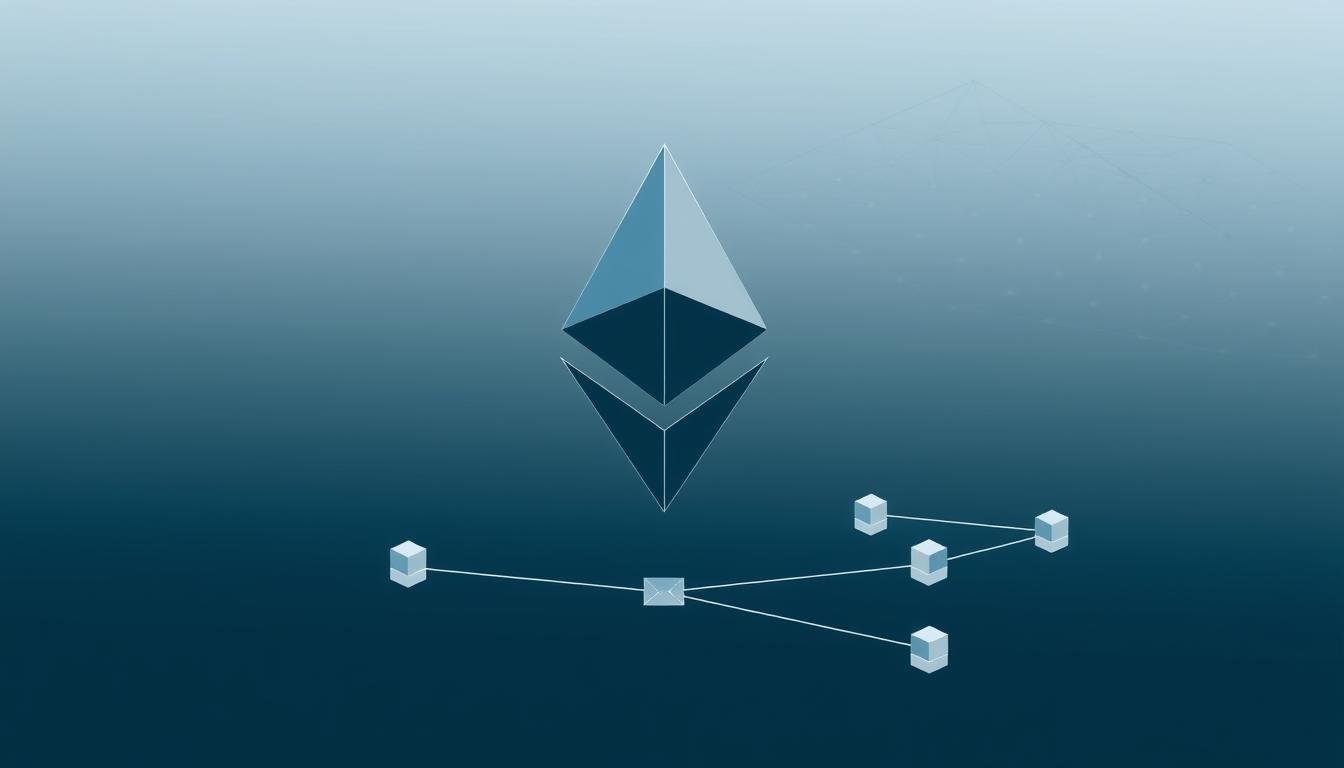Ethereum co-founder Vitalik Buterin has a new plan. He wants to make it easier to run a network node. This could help make the network more decentralized without needing complex setups.
Right now, running an Ethereum node needs a lot of computer power. This can stop many people from joining. Buterin hopes his new idea will get more people involved.
This change is key for Ethereum’s health and decentralization. As Ethereum grows, making it easier to run nodes could boost its security and strength.
Key Takeaways
- Ethereum’s decentralization can be enhanced by simplifying node operation.
- Vitalik Buterin’s proposal aims to reduce the hardware requirements for running a node.
- A more accessible node operation process could lead to increased network participation.
- Simplified node operation can contribute to the overall security and resilience of Ethereum.
- The proposal is a step toward making Ethereum more inclusive for users.
The Current State of Ethereum Node Operation
The Ethereum node operation faces high technical barriers and needs a lot of resources. As of May 19, the Ethereum network had 10,051 active nodes. The full data of the chain reached 1,312 GB and is growing. This growth is a big challenge for node operators.
Technical Barriers Facing Node Operators Today
Running a full Ethereum node needs a lot of technical know-how. Node operators must set up hardware and software, manage security, and fix problems. The technical barriers are a major deterrent for many potential node operators, making the Ethereum network less decentralized.
Some of the key technical challenges include:
- Configuring and maintaining node software
- Managing security risks and vulnerabilities
- Troubleshooting connectivity and performance issues
Hardware and Bandwidth Requirements
Running an Ethereum node requires a lot of hardware and bandwidth. The Ethereum blockchain is over 1 TB, making it hard for most users. Nodes also need fast internet to keep up with blockchain updates.
| Resource | Requirement |
|---|---|
| Disk Space | >1 TB |
| Bandwidth | High-speed internet connection |
| RAM | At least 8 GB (recommended 16 GB or more) |
Knowledge Gap for Average Users
The knowledge gap for average users is a big problem. Most users don’t have the skills to run an Ethereum node. The complexity of node operation keeps many from joining, leading to control by a few big operators.

To solve these problems, we need to make running Ethereum nodes easier. By lowering technical barriers and resource needs, more people can join. This will make the network more decentralized and secure.
Vitalik Buterin Wants to Make Running Ethereum Nodes Simpler for Everyone
Vitalik Buterin has a new plan to make running Ethereum nodes easier for everyone. This move is part of a bigger goal to make the network more open and accessible.
Buterin’s Recent Announcement and Motivation
Buterin has come up with “partially stateless nodes.” This lets users store only a part of Ethereum’s data, not the whole blockchain. He wants to make Ethereum more welcoming and easy to use.
Running a full Ethereum node is currently very hard. It needs a lot of storage and bandwidth. Buterin hopes to make it easier for more people to join the network.
Proposed Technical Solutions
The plan is to use “partially stateless nodes.” Users won’t have to store the whole blockchain. This should make it easier for new node operators to start.
| Technical Solution | Description | Benefits |
|---|---|---|
| Partially Stateless Nodes | Store a subset of Ethereum’s data | Reduced storage requirements |
| Simplified Node Operation | Ease of use for average users | Increased network participation |
Timeline for Implementation
No exact timeline has been set, but the Ethereum community is already talking about it. The plan will likely take several steps, with lots of testing and checks.
As Ethereum grows, making nodes easier to run is key. It helps the network become more decentralized and secure. With more people running nodes, Ethereum can become stronger and more community-focused.
How Simplified Nodes Will Strengthen Ethereum’s Network
A more accessible Ethereum node infrastructure will boost the network’s decentralization and security. By simplifying the process of running Ethereum nodes, more users can help validate transactions. This helps keep the network healthy.
Increased Decentralization Benefits
The plan to make node operations easier could greatly improve decentralization. It lets more users join in without needing complex setups. Vitalik Buterin compared it to a library system, where you keep what you use often and borrow the rest. This shows how the network could become more open and accessible.
Some key benefits of more decentralization include:
- Stronger network against censorship and attacks
- Better transaction validation with more nodes
- A more democratic and open ecosystem for everyone
Security Improvements Through Node Diversity
A diverse set of nodes makes the Ethereum ecosystem stronger. With more users running nodes, the network is safer against attacks. This variety is key to keeping the blockchain safe.
“A robust Ethereum ecosystem is built on the principles of decentralization and security, and simplifying node operations is a step in the right direction.”
How You Can Participate in Network Validation
You can help the Ethereum network by running a node. With easier node operations, it’s now more accessible. Here’s how to start:
- Make sure you have the right hardware and bandwidth
- Download and install the Ethereum node software
- Set up your node to connect to the Ethereum network
By validating the network, you’re helping its security and decentralization. You’re also supporting the Ethereum ecosystem.
Community and Industry Response to Buterin’s Initiative
Vitalik Buterin’s plan to make Ethereum nodes easier to run has caused mixed feelings. People are talking about what it could mean. Different groups have their own opinions on its effects.
Developer Community Feedback
Developers have strong opinions on Buterin’s idea. Some are excited, while others have doubts. Michael Cameron, from Vanilla Finance, said it’s a fresh idea. But he also pointed out that there are still big challenges.
“The proposal feels like a breath of fresh air, but we need to address the challenges associated with state subset selection and fallback options.”
Developers are really thinking about how this will change Ethereum. They wonder if it will make the network more secure and open. Some believe it could make the network stronger.
Competing Blockchain Reactions
Other blockchain projects are watching Buterin’s plan closely. They’re thinking about how to make their own networks easier to run. For example, Cardano’s Charles Hoskinson is looking into similar changes for Cardano.
| Blockchain | Reaction to Buterin’s Initiative |
|---|---|
| Ethereum | Proposal to simplify node operation |
| Cardano | Exploring similar simplifications |
| Polkadot | Monitoring Ethereum’s progress |
What This Means for Your Ethereum Investments
If you invest in Ethereum, Buterin’s plan could be very important. It might make Ethereum more secure and open. This could help its value grow. Investors should watch how this proposal develops.
Buterin’s idea is changing how people see Ethereum’s future. It could make Ethereum easier and safer. This is good news for both current and future investors.
Conclusion
Vitalik Buterin has a new plan to make running Ethereum nodes easier for everyone. This plan is part of EIP-4444, which limits how long data is stored on nodes to 36 days. It also spreads out older data across the network using erasure coding.
This change will make the Ethereum network more decentralized and secure. It lets you help validate the network and keep it healthy. This is great for the Ethereum ecosystem.
Buterin’s proposal will make the Ethereum network stronger and more reliable. As the network grows, using Ethereum will become easier and more enjoyable for everyone.














Leave a Reply